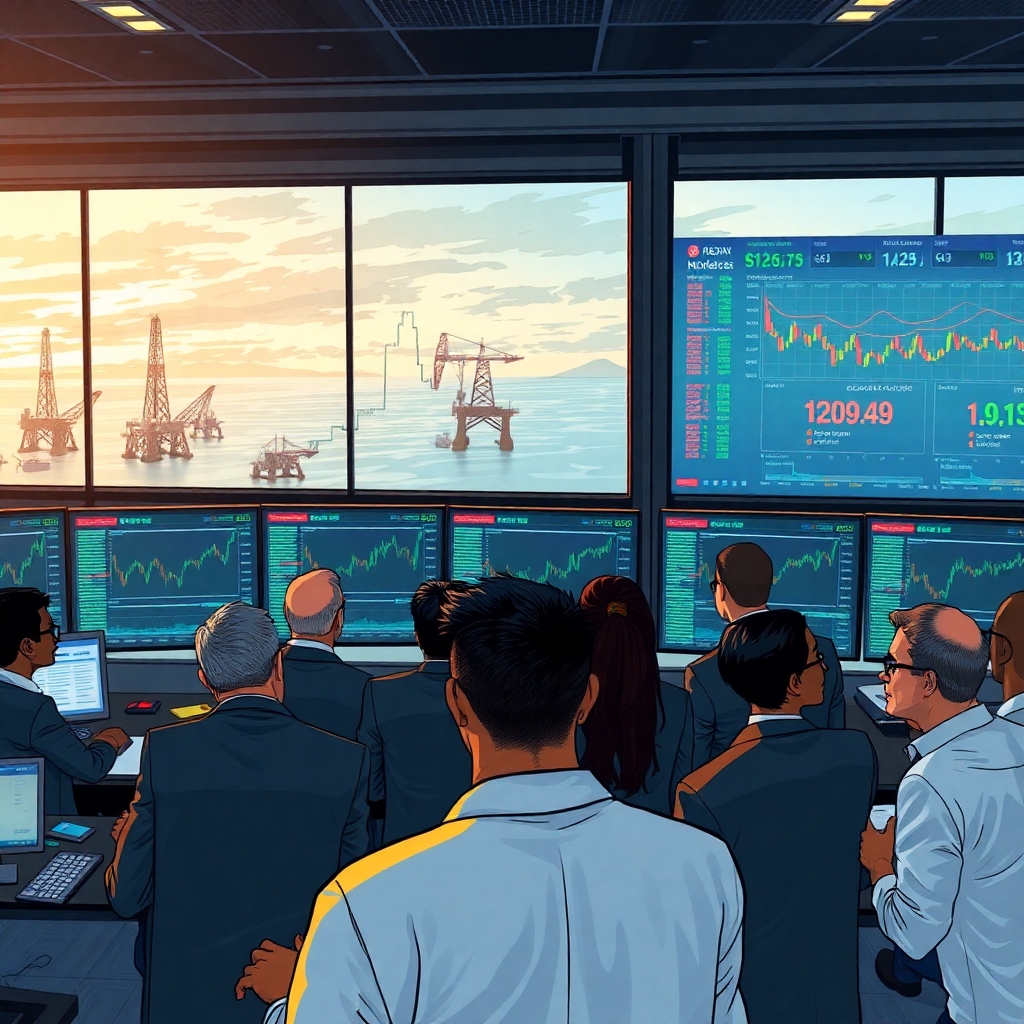Markets Show Surprising Stability Amid Middle East Tensions—Oil Recovers, Stocks Stay Level
Global financial markets are showing unexpected steadiness in the face of renewed geopolitical tensions in the Middle East. As headlines warn of rising conflict, especially near the vital Strait of Hormuz, investors have so far responded with caution, but not with fear. Oil prices have seen a mild rebound, and major stock indices remain mostly flat—suggesting that markets are preparing for potential risk, but not yet reacting with alarm.
This composed behavior reflects a deeper trend: increased investor confidence, improved risk management strategies, and the market’s growing ability to absorb shocks in a rapidly shifting world.
Rising Tensions, Measured Reactions
Over the past week, concerns have grown following reports of drone activity and encounters involving Western naval forces and oil tankers passing through the Strait of Hormuz. Iran’s Revolutionary Guard has also begun new naval exercises, a move many analysts see as a warning amid fragile nuclear negotiations.
While these developments are cause for concern, they haven’t yet led to disruptions in oil supply. However, the region remains a highly sensitive area where any escalation could ripple across global supply chains and financial systems.
Oil Prices Tick Higher, but No Drastic Moves
Brent crude is climbing back toward ninety one dollars per barrel while WTI edges closer to eighty nine showing only a mild upward trend even as regional tensions increase and analysts highlight several stabilizing forces including steady global production from OPEC plus ongoing releases from the US Strategic Petroleum Reserve and Europe’s strengthened LNG infrastructure which together help cushion the market and for now energy experts note that traders remain alert but see no immediate catalyst for a dramatic spike in prices
Equities Hold the Line
Equity markets are displaying a notable sense of calm with only modest shifts into defensive sectors and most major indices maintaining their footing throughout the week as investors adopt a wait and see stance the S and P five hundred shows a slight gain the Nasdaq dips marginally the FTSE one hundred edges higher the Nikkei posts solid momentum and emerging markets register small advances overall creating a picture of markets that are cautious but far from rattle
Oil Hits $100+/Barrel Risk Point if Strait of Hormuz Shuts: Goldman Sachs Warns – CrypTonaryx

Safe-Haven Assets Rise Slightly
Gold, U.S. Treasury bonds, and the Swiss franc—all classic safe-haven investments—have also seen small gains, though nothing extreme.
- Gold rose to $2,070/oz, close to its historical peak.
- 10-Year U.S. Treasury yields dropped a bit to 3.88%, signaling increased but controlled demand for low-risk bonds.
- The U.S. Dollar Index (DXY) stayed level, reflecting balanced investor positioning.
“These are cautious steps, not panic-driven actions,” noted Alyssa Perez of Artemis Global. “Today’s markets are more experienced. They know when to react—and when to wait.”
Crypto Holds Its Ground
Surprisingly, even volatile cryptocurrencies have remained steady. Bitcoin is hovering around the $100,000 mark, while Ethereum continues to trade near $6,000.
Analysts credit the stability to increased institutional interest and wider adoption. With regulated ETFs and more robust infrastructure in place, crypto is no longer just a speculative asset—it’s becoming part of broader investment portfolios.
BTCUSD: Gráfico y precio Bitcoin — TradingView
Investor Mood: Watching, Not Fleeing
Surveys from Bloomberg and Reuters indicate that fund managers remain cautiously optimistic. Unless conflict intensifies significantly, most expect little impact on earnings or portfolios in the short term.
Retail traders are showing similar behavior. Data from apps like Robinhood and eToro suggest investors are shifting toward energy, defense, and dividend-heavy stocks—without making dramatic moves.
“People are tweaking their strategies, not bailing out,” said Jamil Hussain of TruBridge Capital. “It’s not about fear; it’s about being prepared.”
What Could Trigger a Bigger Response
While markets remain unusually steady experts caution that several potential flashpoints could quickly change the landscape a direct clash in the Strait of Hormuz could disrupt one of the world’s most critical shipping channels cyberattacks or strikes on major infrastructure could send shockwaves through financial and energy networks a complete breakdown in diplomatic discussions between Iran and Western nations could escalate tensions further and any unexpected policy shift from OPEC plus regarding production levels could instantly reshape supply expectations and market sentiment together these possibilities represent the kind of catalysts that could rapidly transform the current calm especially within energy markets and across emerging economies
Central Banks Unmoved—for Now
So far, monetary policy hasn’t shifted in response to the tension. The U.S. Federal Reserve kept interest rates between 4.25% and 4.5% in its most recent meeting and signaled no immediate changes unless inflation climbs or supply chains are hit.
The ECB and Bank of England echoed this, maintaining their current stances while monitoring developments closely.
Conclusion: Navigating Uncertainty with Confidence
Despite the tensions brewing in the Middle East, global markets are showing an encouraging level of maturity. Oil prices, equities, and even cryptocurrencies are responding with a sense of caution, not crisis.
Investors appear to be relying on diversified strategies, strong fundamentals, and measured risk management—showing that in today’s unpredictable world, preparation and perspective are more valuable than panic.
